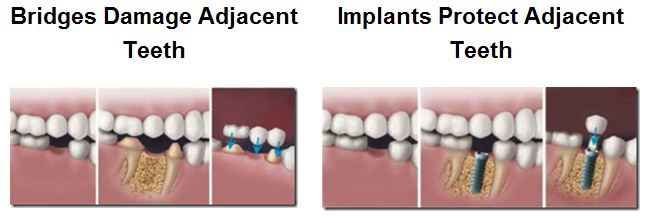Who are dental implants intended for?
People who have a missing tooth or teeth, people with a crown or bridges that they can no longer keep in their mouth, people with dentures (partial or full sets of false teeth) and people who experience discomfort with their everyday functionality.
Dental implants restore your set of teeth, improve functionality, restore confidence and improve quality of life.
What are Dental Implants?
Dental implants are artificial roots capable of directly bonding with the bone and are in fact a substitute for lost teeth.
The implants are made of titanium alloy with a unique surface and form the solid base on top of which the replacement/permanent teeth are mounted.
During the healing process bone cells develop around the implant and bond it to the bone. After the healing process the implants can be used as a foundation for mounting restorative parts including crowns and dental abutments.
The implants allow the patient to regain dental functionality and aesthetics, restoring the natural appearance of the patient’s mouth.
Why should you get dental implants?
Restore missing teeth and enjoy full functionality and aesthetics. Identical look, feel and functionality of a natural tooth.
Quality of life – aesthetics and proper ability to chew. Preservation of adjacent teeth’s integrity and vitality.
Reliability – our implant method has high success rates of over 96%.
Current technology allows multiple tooth implants in just a single, large-scale operation. Dental implants last for many years.
What steps does the Dental Implant Procedure involve?
Treatment in stages:
The dentist performs a diagnosis aided by X-rays, including panning and CT, (according to the patient’s overall medical condition, the amount of usable bone, implant location and additional medical data) and puts together a full treatment plan.
Performing the implant.
A waiting period of several months during which the healing process takes place and the implant integrates with the bone.
Exposure of the implant, measurement and installation of a temporary tooth. Rehabilitation.
At what age are the implants done?
Implants can be done at any age depending on the patient’s suitability and health.
Does the implant harm adjacent teeth?
Treatment by a qualified and experienced dentist, allows the patient to restore missing teeth without touching adjacent natural teeth, thereby avoiding the need to file teeth, perform root canals, and the like.
Dental implants also help prevent movement and early loss of adjacent teeth, and also reduce loads and stresses on the natural teeth.
When would an implant be beneficial to the patient?
A single implant provides an aesthetic and functional restorative solution for patients with a single missing tooth.
A crowned implant prevents the need for filing and root canals for adjacent teeth – there is no need for a large number of crowns, which would be required for a bridge.
Implant Booklet (downloadable)
